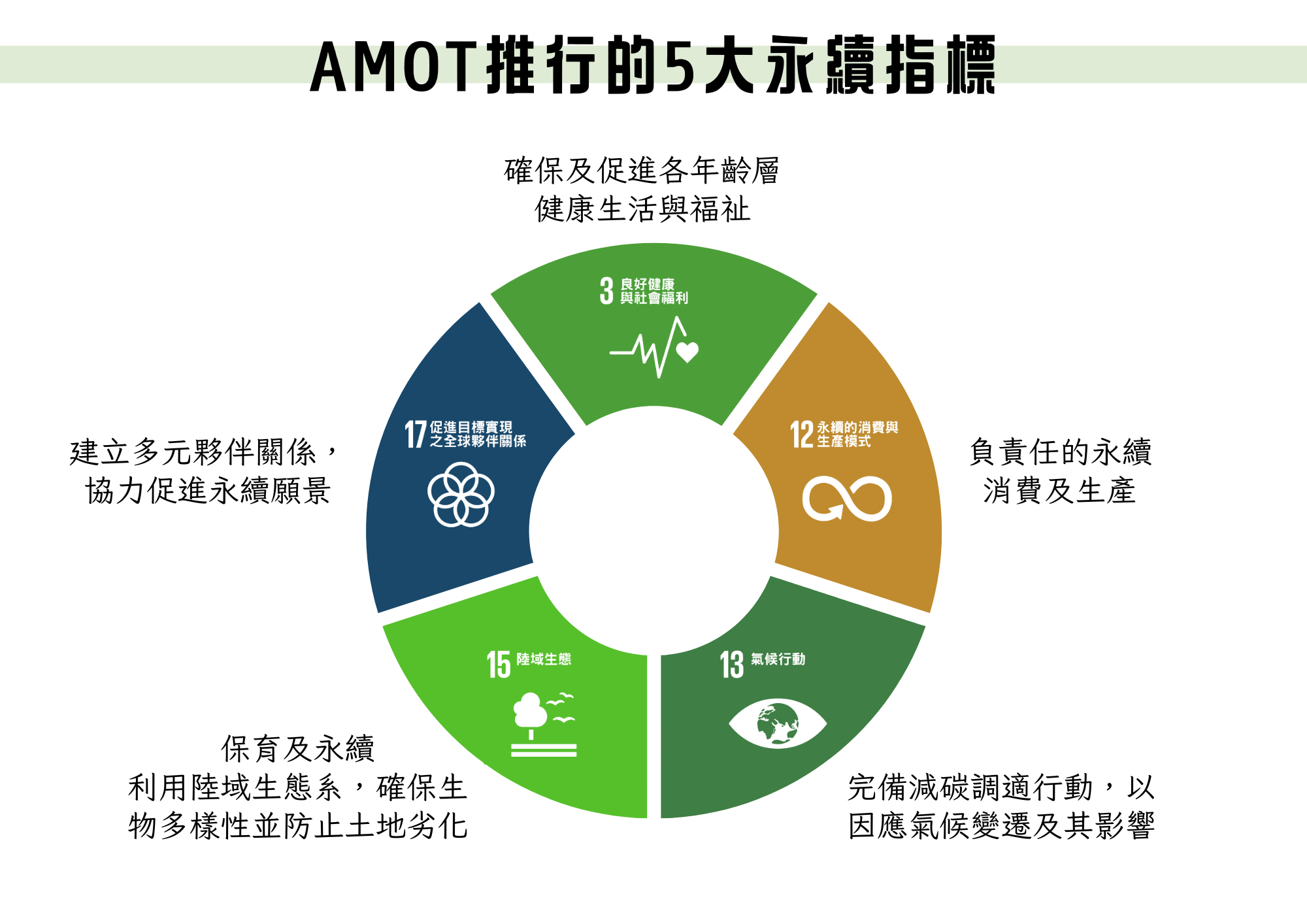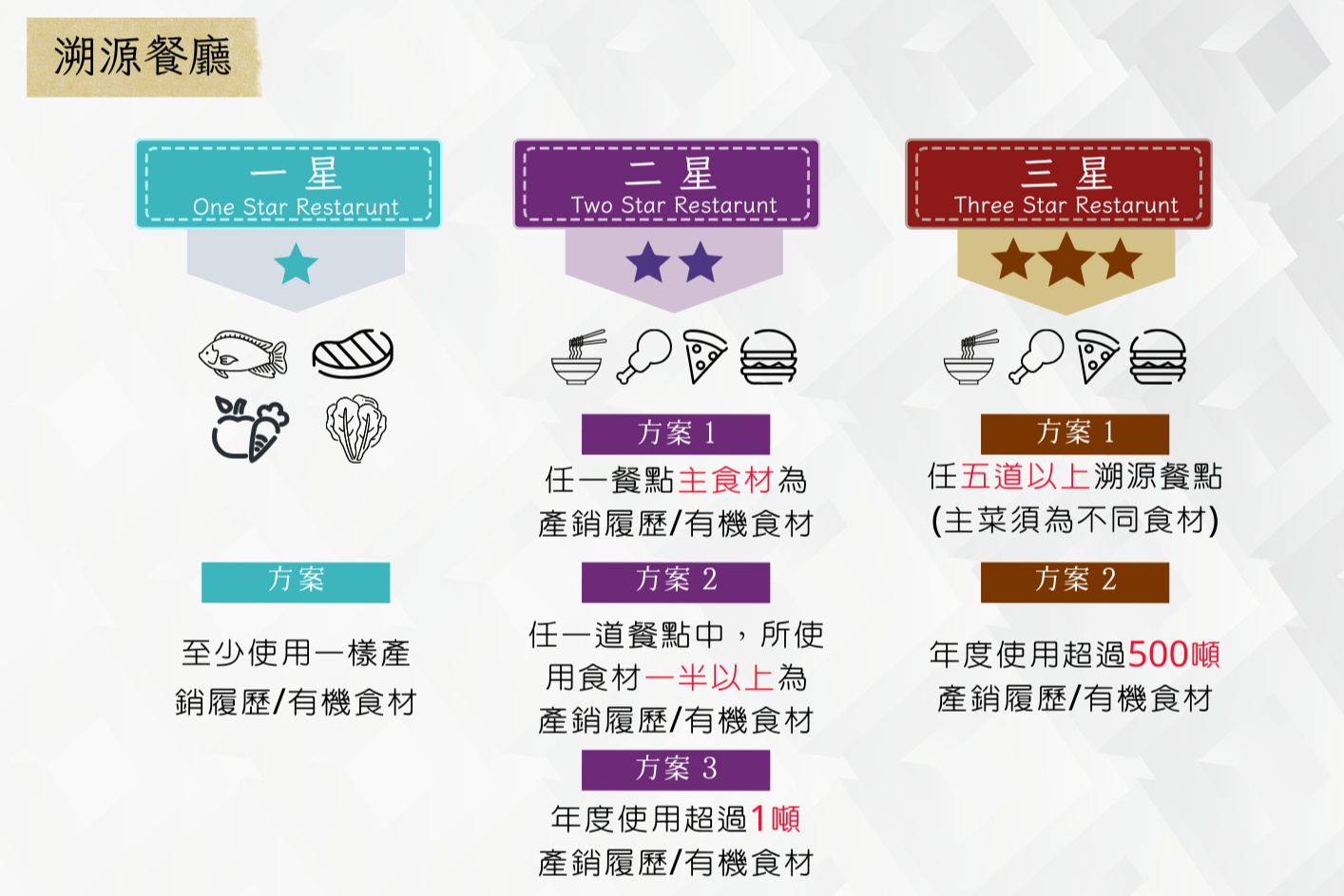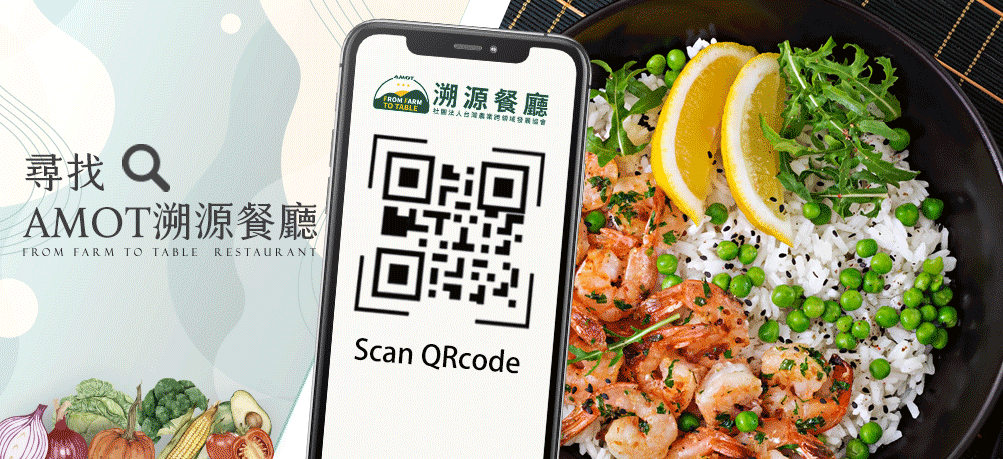關於AMOT溯源餐廳及永續溯源飲食運動
About “Traceability Restaurant Movement” and" Sustainable Dining Campaign."
●緣起 (Origin)
現代人外食需求提高,但對食材安全性的無法掌控一直是消費者一個具有高風險的隱憂,從早餐、便當、甜點下午茶甚至到參加各種活動的高檔餐廳,我們吃下許多不清楚來源的食材與加工原料,日積月累下,影響身體健康至鉅。
The demand for dining out among modern individuals has been increasing, yet the inability to control the safety of food ingredients remains a significant concern for consumers. From breakfast, lunchboxes, and desserts to high-end restaurants frequented for various events, we consume many food ingredients and processed materials with unclear origins. Over time, this accumulation may significantly impact our health.
為了解決這個存在已久的問題,台灣農業跨領域發展協會 (簡稱AMOT協會)於2013年起與農業部合作,逐步為台灣建構出食材追溯從產地到餐桌 (From Farm to Table) 的管理機制,溯源餐廳因而誕生,首創溯源平台連結產銷履歷及有機資料庫,使餐廳使用的食材來源更即時透明,只要在點餐前掃描溯源餐廳QR code,便能看到食材進貨的時間與來源,讓社會大眾可以輕鬆掌握這些通過安全驗證食材的來源,及確認食材新鮮與否。
To address this long-standing issue, the Agriculture Multi-Discipline Association of Taiwan (referred to as AMOT) has began collaborating with the Ministry of Agriculture of Taiwan in 2013. Together, we gradually established a management mechanism for food traceability from farm to table in Taiwan. As a result, “Traceability Restaurant” emerged, pioneering a food traceability platform that connects with both of the databases of the Taiwan Good Agriculture Practice (known as TGAP) and organic ingredients. This ensures greater transparency in the sourcing of ingredients used by restaurants. By simply scanning the QR code of a “Traceability Restaurant” before ordering, consumers can view the time and source of ingredient procurement, allowing the public to easily access information about the origin of ingredients that have passed safety verification, as well as confirm their freshness.
●發展歷程及成果 (Development and Achievements)
AMOT創立後,即於2013年起以推動溯源餐廳和溯源食品為主,歷經逾十年的發展終於在台灣建立起超過1,200家的「AMOT溯源餐廳」,以及引領逾40家知名企業和團體超過10萬名員工及其眷屬加入的「永續溯源飲食運動」,共同積極投入聯合國永續發展指標SDGs 12 「永續消費及生產」 的目標,希望藉由更多消費者對安全溯源食材的重視,驅使餐廳使用更多安全溯源的食材,吸引農民生產更多符合驗證制度的安全食材,進而維護地球生態及農業的永續發展。
Since its establishment, AMOT has been primarily focused on promoting Traceability Restaurant and traceable food products since 2013. After more than a decade of development, AMOT has successfully established over 1,200 AMOT Traceability Restaurants in Taiwan. Additionally, it has led more than 40 well-known enterprises and organizations, with over 100,000 employees and their families joining the " Sustainable Dining Campaign." Together, they actively contribute to the United Nations Sustainable Development Goals (SDGs) 12, "Responsible Consumption and Production." By encouraging consumers to prioritize safe and traceable ingredients, the movement aims to motivate restaurants to use more traceable ingredients, so as to attract farmers to produce more safety-certified food, and ultimately contribute to the sustainable development of the earth's ecosystem and agriculture.
◆2011 - 創立 - Founded
由AMOT協會結合台灣農漁畜禽產業及政大EMBA企業人脈資源所成立。
Established by AMOT in collaboration with Taiwan's agricultural, fishery, livestock, and poultry industries, as well as the business network resources of National Chengchi University's Executive Master of Business Administration (EMBA) program.
◆2013 - 建立溯源餐廳 - Established Traceability Restaurants
與農業部攜手合作,為台灣建構出食材追溯從產地到餐桌 (From Farm to Table) 的管理機制,歷經逾10年的拓展,建立出超過1,200家的「AMOT溯源餐廳」,包括王品集團、麥當勞、礁溪老爺酒店、六福集團萬怡酒店、饗賓集團果然匯、築間餐飲集團、全家集團大戶屋、靜宜大學、雲品和君品酒店、和信醫院、禾馨醫療、禾馨月子餐等多元跨領域品牌在內,都紛紛加入。
In collaboration with the Ministry of Agriculture, AMOT has worked to establish a management mechanism for food traceability in Taiwan, ensuring that food can be traced from its origin to the table (From Farm to Table). Over the course of more than 10 years, they have successfully developed over 1,200 AMOT Traceability Restaurants. These include a diverse range of cross-sector brands such as the Wowprime, McDonald's, Hotel Royal Chiao Hsi, Courtyard Taipei, Eatogether., Jhu-Jian Catering Group, OOTOYA Japanese Restaurant,Providence University, Fleur De Chine Hotel and Palais de Chine Hotel, as well as Koo Foundation Sun Yat-Sen Cancer Center, Dianthus Medical Group, and Dianthus Postpartium Center, etc.
◆2019 - 推動「永續溯源飲食運動」- Launched the "Sustainable Dining Campaign"
AMOT由農業出發,協助餐廳、企業、醫院及學校等機關團體加入「永續溯源飲食運動」,共同積極投入聯合國永續發展指標SDGs 12 「永續消費及生產」的目標,希望透過團體力量帶動更多消費者去溯源餐廳用餐,鼓勵餐廳使用更多安全溯源的食材,吸引農民生產更多符合驗證制度的安全食材,進而維護地球生態及農業的永續發展。
Starting from agriculture, AMOT assists restaurants, businesses, hospitals, and schools in joining the " Sustainable Dining Campaign." Together, we actively contribute to the United Nations Sustainable Development Goals (SDGs) 12,"Responsible Consumption and Production." Through collective efforts,we aim to encourage more consumers to dine at Traceability Restaurant, promote the use of safer and traceable ingredients in restaurants, attract farmers to produce more safety-certified food, and ultimately uphold the sustainable development towards the earth's ecosystem and agriculture.
◆2020 - 推出溯源食品 - Introduced Traceability Food products
因應消費者對美豬進口後的疑慮,推出從產地到食品廠的產銷履歷食材追溯機制。
In response to consumers’ concerns regarding imported American pork, we have launched a traceability mechanism for food ingredients, tracing them from their place of origin to the food processing plant.
◆2023 - 進入歐盟及聯合國宣傳推廣 - Promotion and Advocacy within the European Union and the United Nations
2023年10月應外交部邀請於荷蘭舉辦的SEWF23全球社企論壇辦理的Taiwan Stage對歐盟及美加與東南亞國家演講,同年於12月參加在杜拜舉辦的聯合國氣候峰會COP28的週邊會議,演講AMOT於台灣推動溯源食材從產地到餐廳的十一年發展經驗,獲得在場嘉賓重視及其他NGO組織代表的合作邀約。
In October 2023, AMOT was invited by the Ministry of Foreign Affairs to attain the “Taiwan Stage” at the SEWF23 Global Social Enterprise Forum held in the Netherlands. During this event, speeches were delivered to the European Union, North America, and Southeast Asian countries. Later in December of the same year, AMOT participated in the side event of the United Nations Climate Summit COP28 in Dubai. At this meeting, AMOT shared its ten years of experience in promoting traceable food ingredients from their place of origin to restaurants in Taiwan. The speeches were well received by the attendees, leading to invitations for further cooperations from the representatives of other NGOs.
●服務核心(Service Core)
AMOT十一年前啟動的「溯源餐廳運動」,及五年前推出的「永續溯源飲食運動」皆為與氣候變遷和環境永續直接相關且具規模的先導案例。同時,AMOT於2022年展開第一階段可溯源食材的運輸里程碳排放低碳飲食揭露服務,並於2023年開始擴大邀請更多餐廳加入低碳餐飲的揭露服務。期許未來可跟更多重視ESG發展的企業機構/團體合作,從照顧自身員工或會員的安全溯源飲食做起,並宣導員工或會員外食餐敘優先選擇溯源餐廳,由企業機構/團體帶領所有員工和眷屬或會員一起落實聯合國SDGs 12「永續消費及生產」指標及台灣政府所推動的全民淨零減碳綠生活的目標。
AMOT launched the "Traceablility Restaurant Movement" ten years ago, followed by the " Sustainable Dining Campaign " introduced four years ago. Both are significant and scalable pilot projects directly related to climate change and environmental sustainability. In 2022, AMOT initiated the first phase of low-carbon dining disclosure services, revealing the carbon emissions from the transportation mileage of traceable food ingredients. In 2023, efforts were expanded to invite more restaurants to participate in the disclosure of low-carbon dining services. The goal is to collaborate with more enterprises and organizations that prioritize ESG development. Starting from ensuring the safety of their own employees or members through traceable dining, they advocate for choosing Traceability Restaurants as the preferred dining option for employees or members. These enterprises and organizations can lead all employees, their families, or members to implement the United Nations SDGs 12 "Responsible Consumption and Production" and the Taiwanese government's goal of promoting a nationwide net-zero carbon green lifestyle.
●什麼是溯源餐廳和溯源食品?
What are “Traceability Restaurant” and “Traceability Food”?
溯源餐廳和溯源食品皆是代表消費者可以透過AMOT雲端平台查詢哪些餐廳的哪道菜餚,或是哪些食品品牌的哪些品項有使用產銷履歷或有機食材,資訊內容包括最近一次進貨紀錄、生產者、產地及生產紀錄或相關驗證資訊等。
The “Traceability Restaurant” and “Traceability Food” products both represent that consumers can use the AMOT cloud platform to inquire about which dishes are available in restaurants or which items from food brands use the TGAP or organic ingredients. Information content includes the most recent purchase records, producers, places of origin, production records, or related verification information.

●什麼是永續溯源飲食運動? What is “Sustainable Dining Campaign”?
AMOT協會有鑑於農糧生產模式及餐飲的龐大消費鏈對於台灣的環境生態永續發展有關鍵性的影響力,故 於2019年起推動「永續溯源飲食運動」,整合上千家的溯源餐廳門市及溯源企業,揭露食材來源及運輸里程碳排放,一起響應聯合國永續指標SDGs12「永續消費及生產」的目標,讓每個人皆能透過每餐的飲食來共同守護這片土地,努力維護生態環境。
The AMOT Association, recognizing the massive impact of agricultural farming methods and the large-scale of catering businesses markets on the environmental and ecological developments in Taiwan, has initiated the "Sustainable Dining Campaign" since 2019. This movement integrates thousands of Traceability Restaurants, well-known listed companies and NGOs (please see the joining brands as below), disclosing the sources and cultivating practices of ingredients as well as their carbon emissions when shipping from farm to restaurants, to encourage consumers to make responsible consumption when dining out. Thus so, the United Nations SDGs 12 "Responsible Consumption and Production" can be aggressively achieved by everyone from their daily meals’ choices in pursuit of the sustainable environment and ecological biodiversity of our planet.

●如何加入溯源餐廳? How to Join a Traceability Restaurant?
溯源餐廳需使用至少一項產銷履歷或有機食材。
The“Traceability Restaurant” must use at least one TGAP or organic ingredient.
產銷履歷包括廠商栽種或養殖的過程紀錄,以及批次加工如洗選、分切、包裝及出貨等紀錄與風險管控的制度,有機食材以在地不使用化學肥料及化學農藥,也不使用基因改造或其產品,進行農產品的生產。
The TGAP ingredients include records of the cultivation or breeding process by manufacturers, as well as batch processing such as washing, sorting, cutting, packaging, and shipping, which are all along with systematic records for risk control. The organic ingredients refer to agricultural products produced locally without the use of chemical fertilizers, pesticides, genetically modified organisms, or their products._hxpCmm8.png)
●哪些機構可以加入溯源餐廳或溯源食品?
Which institutions can join “Traceability Restaurant” or “Traceability Food”?
舉凡販售或料理可食用餐點的場所等機構皆可申請加入溯源餐廳;同時,只要食品業者有使用產銷履歷食材製成加工品項,以及委外或自有的加工廠符合HACCP或ISO或GHP資格者皆可申請加入AMOT溯源食品。
Any establishment that sells or prepares edible meals can apply to join the “Traceability Restaurant”. Additionally, food industry operators who use the TGAP ingredients to produce processed items, and whose outsourced or in-house processing plants meet HACCP, ISO, or GHP qualifications, can apply to join AMOT “Traceability Food”.
●加入溯源餐廳的餐點每一樣都是可追溯食材嗎?
Are all dishes in the “Traceability Restaurant” using traceable ingredients?
加入AMOT溯源餐廳的基本條件是使用產銷履歷或有機食材,為了鼓勵餐飲業者積極使用產銷履歷或有機食材,AMOT協會推出了「星級溯源餐廳」的星級評鑑制度,依照產銷履歷食材使用程度分一星到三星,使用程度越高則星星數越多。
The basic requirement for joining the AMOT Traceability Restaurant is to use TGAP or organic ingredients. In order to encourage food service operators to actively use these ingredients, AMOT has introduced the “Traceability Restaurant Star Rating Criteria”. It awards one to three stars based on the extent of usage of the TGAP or organic ingredients, with a higher star rating indicating a higher level of usage. 
●如何知道餐廳是否使用產銷履歷食材?
How can I tell whether a restaurant uses TGAP ingredients?
AMOT溯源餐廳平台會定時追蹤供應商端出貨至餐廳的進貨狀況,若有中斷進貨的情形,將即時調整平台食材資訊狀態。
The AMOT Traceability Restaurant platform regularly tracks the procurement status of shipments from suppliers to restaurants. If there is any interruption in procurement, the platform will adjust the status of ingredient information in real time.

關於台灣農業跨領域發展協會(AMOT)
AMOT於2011年在台北市成立,當時正逢台灣發生食品添加塑化劑事件,遂以建立可視化追溯系統為訴求,希望帶動餐飲業者自主化管理良知,共同為國人打造可信任的食材追溯紀錄而努力。
AMOT was founded in Taipei City in 2011, coinciding with Taiwan's food additive plasticizer incident. It aimed to establish a visual traceability system, advocating for self-regulated conscientious management among food and beverage industry stakeholders. The goal was to collectively create trustworthy food ingredient traceability records for the people of the nation.
歷經十年發展出全球首創從產地到餐廳不斷鏈追蹤食材來源,以及透過對餐廳端設計的動態星級評鑑制度及餐點使用食材持續更新等服務特色,達到激勵餐廳採用更多安全驗證食材的目標,期許改變農民傳統生產模式,朝向永續農業發展,維護地球生態,減緩氣候變遷。
After a decade of development, AMOT has pioneered the world's first continuous traceability system, tracking food sources from production to restaurant. Additionally, it has introduced dynamic Star-rating evaluation systems for restaurants and continuously updated services regarding ingredient usage in dishes. These efforts aim to incentivize restaurants to adopt more safety-verified ingredients, with the ultimate goal of transforming traditional farming practices, promoting sustainable agriculture, preserving the Earth's ecology, and mitigating climate change.

Powered by Froala Editor






